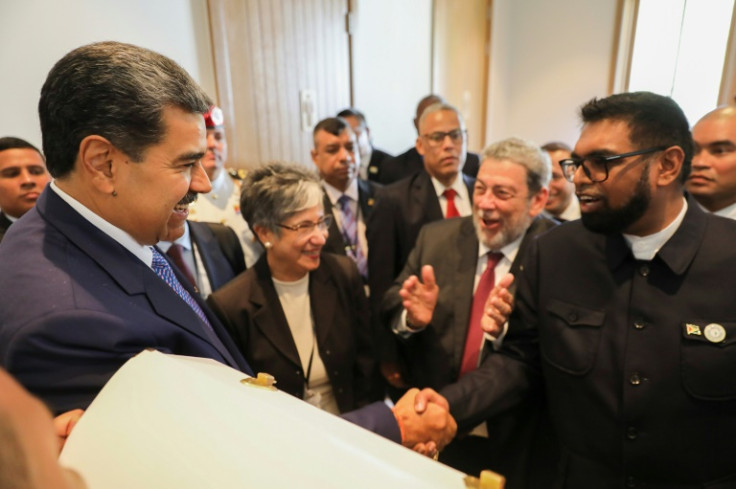
Guyanese President Irfaan Ali said Friday that his country wants to remain at peace with neighboring Venezuela amid a century-old dispute over sovereignty of the Essequibo region, which flared up late last year.
"We want peace. We want prosperity for our neighbors and all in this region," Ali said at a summit of the Community of Latin American and Caribbean States (CELAC) in St. Vincent and the Grenadines.
"I am prepared to speak with President Maduro on any aspect that may contribute to enhancing the relationship between our two countries."
Venezuela has long claimed Essequibo -- which makes up about two-thirds of Guyana's territory -- and fears of a military conflict rose late last year before both countries pledged to refrain from the use of force to settle the border dispute.
Friday's meeting marked a far more relaxed encounter than the one between the two leaders last December, also in St. Vincent and the Grenadines.
Ali gave a bottle of rum and a medal of his country to Maduro, who offered a box full of Venezuelan products in return. "Peace and love!" Maduro told him in English.
"I hope that the good relations that have been established for dialogue deepen... and that we look for, face to face... a healthy, peaceful and diplomatic solution to the differences and controversy that we have had since the 19th century," Maduro said Friday.
Among presidents at the summit were Luiz Inacio Lula da Silva of Brazil, Gustavo Petro of Colombia, Miguel Diaz-Canel of Cuba, alongside UN Secretary-General Antonio Guterres.
The dispute over the Essequibo region is the subject of border litigation before the International Court of Justice in The Hague -- whose jurisdiction in the matter Venezuela rejects.
The region is home to 125,000 of Guyana's 800,000 citizens.
The row was revived in 2015 when US energy giant ExxonMobil discovered huge crude reserves in Essequibo, and reached fever pitch last year after Guyana started auctioning off oil blocks in the region.
Maduro's government then called a controversial nonbinding referendum that overwhelmingly approved the creation of a Venezuelan province in Essequibo, according to official results.
Tensions remained high earlier this year with the arrival of a British warship in Guyanese waters, to which Caracas responded by mobilizing more than 5,600 troops in military exercises near the disputed border.
Ali reiterated that the exercises "had nothing to do with the ... controversy," while denouncing "incursions into Guyana's territorial space," without specifying details.



